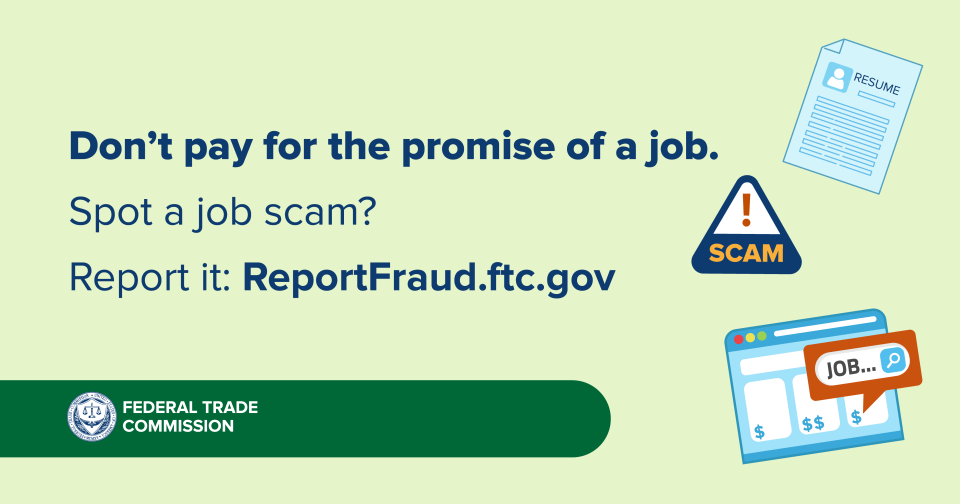You might have just graduated from college, but there’s still more to learn when you’re on the job hunt. Not every posting or job recruiter is legit. Learn how to spot the scams.
We’ve been getting reports about a scam that starts out with a job recruiter reaching out to ask for your resume. Sounds normal — right? Well, that’s where “normal” ends. After you send that over, you’re told that the format is “incompatible.” The next thing you know, you’re asked to send your resume to a website to “reformat” it — for a fee. In other words, they’re asking you to pay for a job.
To avoid job scams
- Do an online search. Look up the name of the company or the person who’s hiring you, plus the words “scam,” “review,” or “complaint.” You might find out they’ve scammed other people.
- Talk to someone you trust. Describe the offer to them. What do they think? You don’t want to be rushed into a decision.
- Don't pay for the promise of a job. Legitimate employers, including the federal government, will never ask you to pay to get a job. Anyone who does is a scammer.
Spot a job scam? Tell the FTC at ReportFraud.ftc.gov.


Thanks for this good and timely article.
My caveat from my experience: you should see Red Flags when a prospective employer's Technical Interview asks you to perform a wide / vague list of tasks including but not limited to: identifying flaws in Construction Drawings, Technical Specifications among other Bid documents - and participate in an interview with the project owner to win a project without first signing you on to be an official employee or enter into a written contract as an independent contractor (receive 1099) prior to this type of "Technical Interview".
I brought this issue up with a recruiter I was using who explained this practice from employers who try to get (free) work from applicants and others they find on career networking sites.
I have received multiple calls, emails, texts and even DMs from within LI, Indeed and other platforms that I believe were scams. The FTC advice on the “resume formatting” trick is one way to scam but not the worst by far. Applicants put way too much personal information into cyberspace without any real assurance the posting is legit. Jobsites allow any “Recruiter” who will pay a fee access to entirely too much information about YOU THE APPLICANT. This information may include your address, phone numbers, private email, detailed work/locations information. Also those scores from the largely entertaining but unscientific and unvalidated “competency tests” can (and do) kneecap applicants. Also most of those jobsites sell your personal data and/or exchange it without the applicant (who only wanted a job) knowing who all now has access to information they’d prefer to keep private. DOL, FTC, HHS (HIPAA), or some other alphabet agency really needs to investigate these practices - Applicants must surrender their privacy to be gainfully employed and that is unAmerican. Congress needs to disallow posting sites and/or employers from selling Job Applicants’ data. Period.
I can’t use my phone to do anything at all. All i do is cry. I’ve lost all hope. I lost my medical lab job working front line, literally, June 2021 and went back down on isolation with severe depression. My hacker/hackers crippled me to the point of hopelessness and despair. Can’t care for myself and lost all my independence and can’t leave a very abusive relationship as I have no means to. This is my last failed attempt to even try